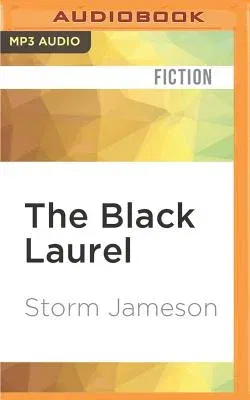Much of the action of The Black Laurel takes place in Berlin, 1945.
But it is not a novel about Germany. It concerns a group of English
people whose duties or interests place them in Berlin during the first
summer of the Occupation. They are involved with one another through
their position in occupied territory or through their friendships, and
by their interest in the fate of one German who has been arrested and
condemned.
The action moves swiftly between the ambitions and anxieties of a
general; the curious intentions of a Very Important Person; the feverish
or helpless twistings of Germans trapped by defeat; the education,
friendships, and loves of young men. As in life, the private conflicts
meet and distort the human relations.
When Major-General Lowerby's oldest and closest friendship gets in the
way of his ambitions, which does he choose? When William Gary, for whom
human beings have been instruments, tries to turn to a human loyalty and
devotion, can he escape the involuntary callousness of his own mind?
Colonel Brett stumbles over his own folly as much as his honesty. Lise
and Arnold, pretending to a sophistication neither has, have to find
their way back through separate disillusions, to the simplicity of their
young love.
The German characters are drawn with a rare knowledge of the conflicts
in the German soul: the polished gentleman who will allow any crime for
the sake of his family estate; the wound-crippled boys, living on their
wits, nerves, and passions; the man, at once scholar and brute, who is
abandoning the West for the despised and feared East. Behind the
suspense of the narrative, and the sharp images of ruin and fever, rises
another image--the image, the reality, of Europe, 1945.
Storm Jameson (1891- 1986) born to a North Yorkshire family of
shipbuilders. Jameson's fiery mother, who bore three girls, encouraged
Storm (christened Margaret Storm) to pursue an academic education. After
being taught privately and at Scarborough municipal school, she won one
of three county scholarships which enabled her to read English
literature at Leeds University. She then went on to complete an MA in
European drama at King's College London.
During her career Jameson wrote 45 novels, in addition to numerous
pamphlets, essays, and reviews, in an effort to make money. Her personal
life suffered, and her first marriage to schoolmaster Charles Douglas
Clarke was an unhappy one. After they divorced, in 1925, Jameson went on
to marry Guy Chapman, a fellow author, and remained with him despite her
apparent rejection of normal domestic life.
Storm Jameson was always politically active, helping to publish a
Marxist journal in the British section of the International Union of
Revolutionary Writers in 1934 and attending anti-fascist rallies.

